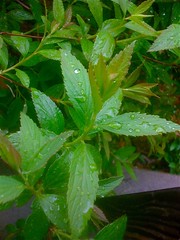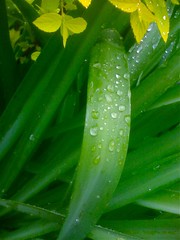
My brand-spanking-new Sigma 18-50mm f2.8 is away at Sigma getting fixed, and I've been jonesing for it. So yesterday evening I was out in the yard with the daughter, and I snapped a couple of images with the iPhone. This made me think about the whole gear vs talent debate. Is it really the hardware? Are good images actually good images by dint of the proper exposure and sharpness and color reproduction? Or is there some ability, talent, training, or what-have-you that translates into "photographer"?
I know where I stand on this debate; same place I always have. Art is, by definition, opinion. It has always been opinion, and it will always be opinion. There's no chart that discerns Art from more mundane products of human effort, no hard-and-fast yardstick by which we can measure artistic integrity, beauty, or talent. I have always main
tained that if a man says what he does is Art, then I must, in good faith, accept that it is Art. I may then discern only whether or not I appreciate it as art. I can argue that it is bad art, or that it is good art, and I can certainly argue for or against it, but I cannot in any reasonable manner proclaim that it is not art.
reasonable manner proclaim that it is not art.
 reasonable manner proclaim that it is not art.
reasonable manner proclaim that it is not art.Ultimately the things that are judged to be great art by history are those which hold the fancy of society over a great period of time. This is what separates a fad, a fashion, from a great work of art. It's not simply that people like it; it's that people like it beyond its contemporary milieu. If someone is humming "Eleanor Rigby" one hundred years from
now, I think it will be safe to say that The Beatles created great music, not just popular music. If someone regards Jackson Pollock's work with reverence in the year 2100, I will stand corrected.
How does all this relate to the hardware vs. talent debate? Well, it's because these things make it painfully obvious to me that cameras are tools, just as paint brushes and guitars and chisels are. They create nothing without an actor, without a spark, and ultimately their record is not a mere collection of pixels, but a record of the intent - however whimsical - of the photographer, whether that photographer is Robert Mapplethorpe, Leonard Nimoy, or your old aunt Jeanie. That image is art. Good art, bad art, nonsensical art, ridiculous art - but it is art.
pixels, but a record of the intent - however whimsical - of the photographer, whether that photographer is Robert Mapplethorpe, Leonard Nimoy, or your old aunt Jeanie. That image is art. Good art, bad art, nonsensical art, ridiculous art - but it is art.
 pixels, but a record of the intent - however whimsical - of the photographer, whether that photographer is Robert Mapplethorpe, Leonard Nimoy, or your old aunt Jeanie. That image is art. Good art, bad art, nonsensical art, ridiculous art - but it is art.
pixels, but a record of the intent - however whimsical - of the photographer, whether that photographer is Robert Mapplethorpe, Leonard Nimoy, or your old aunt Jeanie. That image is art. Good art, bad art, nonsensical art, ridiculous art - but it is art.The modern digital camera has certainly democratized photography in a way nothing else has. Now anyone can have their own digital darkroom for a ridiculously small quantity of money, and the cost per shot has plummeted. Thus, almost anyone can produce a few good photographs over time by sheer numbers. The shotgun approach, if you will. Take enough pictures, point that camera at enough things, and a few are bound to be worth noting. This is a good thing, not a bad one. It does have the unfortunate side effect of making many who have created such 'lucky' images believe that it's simply having the right hardware, because they didn't put any effort into the image. Let's face it; you can't accidentally draw a wonderful charcoal rendering of Mt. Rushmore, but it's quite possible for events to conspire in your behavior as you record exactly the right light and composition as you pop off your seven-hundred and twenty-fifth vacation picture.
No matter how you cut it, though, I hold to my mantra, in every aspect of life. If you give a tool, no matter what quality, to someone with talent, the result of its use will be better than that of someone with no talent. Sounds generic, I know, but it is generic. Just for photographers, though: If you give any camera to a talented photographer, and the same camera to your Aunt Jeanie, when the memory card is full, the pictures from the photographer will be visibly better images. Now, better Art? Only time can answer that question.
No comments:
Post a Comment